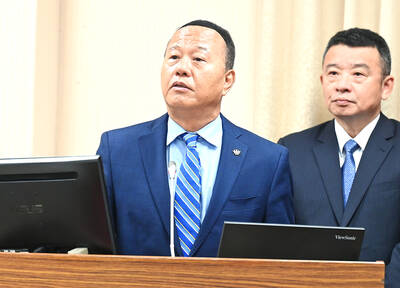An exhibition commemorating South Korea’s Gwangju Uprising opened in Taipei yesterday.
To mark the 39th anniversary of the South Korean pro-democracy movement, as well as the 40th anniversary of Taiwan’s Kaohsiung Incident, the Transitional Justice Commission invited organizers of the Gwangiu exhibition to present it in Taiwan, Democratic Progressive Party (DPP) Legislator Lin Ching-yi (林靜儀) told a news conference.
The Kaohsiung Incident, also known as the Formosa Incident, took place on Dec. 10, 1979, when a demonstration organized by opposition politicians and Formosa Magazine to commemorate Human Rights Day turned violent.

Photo: Chien Jung-fong, Taipei Times
Members of the crowd unknown to the organizers — and widely believed to have been agents provocateurs — began attacking police, which was followed by the then-Chinese Nationalist Party (KMT) government arresting and jailing a group of political dissidents.
The Gwangju Uprising — also called the May 18 Democratic Uprising — against martial law took place in Gwangju, South Korea, in 1980.
More than 200 people died or went missing, official figures showed, while advocates have said that the toll might have been three times higher.
Commission Acting Chairwoman Yang Tsui (楊翠) said that the agency saw the exhibition held by the South Korean National Assembly during a visit in June and was inspired by its efforts in exhibiting historical wounds to create an opportunity for forgiveness and reconciliation.
The exhibition demonstrated how to implement transitional justice at the right pace, she added.
Victims of the uprising have witnessed public apologies by the South Korean government, DPP legislator-at-large nominee Fan Yun (范雲) said, adding that several movies documenting the democratic process and independent reports about the female victims in the uprising have been made.
On the other hand, Taiwan does not have any movie dedicated to the Kaohsiung Incident, let alone independent investigation reports about female victims, she said.
Nor has anyone apologized for the incident and transitional justice has not been achieved, as it remains unanswered who should be held accountable for turning the peaceful protest into a violent uprising, she added.
May 18 Archives researcher Lee Deok-jae said that after martial law was imposed in South Korea, soldiers entered Gwangju and began massacring people.
The uprising gave rise to the pro-democracy movement in South Korea, as its ripple effects spread not only within Gwangju, but across the nation, Lee said.
The 228 Massacre in Taiwan must have been similar, he added.
The 228 Massacre refers to an uprising that was ignited on Feb. 27, 1947, against the then-KMT regime and a resulting crackdown that left tens of thousands of people dead and launched the White Terror era.
May 18 Memorial Foundation Education Culture and Department manager Gwon Hyeok-min said that she was in Gwangju when the uprising started, which was why she can sympathize with victims of the 228 Incident and the Kaohsiung Incident, as she understood how it felt to be called a “rioter.”
Taiwan’s 40-year-long government oppression during the Martial Law era can have devastating effects on the mental health of its victims, Gwon said, expressing the hope that efforts to implement transitional justice could heal the trauma.
The exhibition runs until Dec. 22 at an open space across from the National Audit Office on Taipei’s Hangzhou N Road. Admission is free.

VIGILANCE: The military is paying close attention to actions that might damage peace and stability in the region, the deputy minister of national defense said The People’s Republic of China (PRC) might consider initiating a hack on Taiwanese networks on May 20, the day of the inauguration ceremony of president-elect William Lai (賴清德), sources familiar with cross-strait issues said. While US Secretary of State Anthony Blinken’s statement of the US expectation “that all sides will conduct themselves with restraint and prudence in the period ahead” would prevent military actions by China, Beijing could still try to sabotage Taiwan’s inauguration ceremony, the source said. China might gain access to the video screens outside of the Presidential Office Building and display embarrassing messages from Beijing, such as congratulating Lai

Four China Coast Guard ships briefly sailed through prohibited waters near Kinmen County, Taipei said, urging Beijing to stop actions that endanger navigation safety. The Chinese ships entered waters south of Kinmen, 5km from the Chinese city of Xiamen, at about 3:30pm on Monday, the Coast Guard Administration said in a statement later the same day. The ships “sailed out of our prohibited and restricted waters” about an hour later, the agency said, urging Beijing to immediately stop “behavior that endangers navigation safety.” Ministry of National Defense spokesman Sun Li-fang (孫立方) yesterday told reporters that Taiwan would boost support to the Coast Guard

BOOST TO SPORTS? The Executive Yuan said that the amendment was introduced to attract professionals to Taiwan, and increase the incentives for naturalization The Legislative Yuan yesterday passed on third reading an amendment to the Nationality Act (國籍法) that would reduce the minimum residency period required for highly skilled professionals to apply for naturalization from three to two continuous years, with a minimum of 183 days in Taiwan each year. The 183-day requirement does not apply if an eligible applicant has lived legally in the territory of the Republic of China for more than five continuous years. Taiwan’s professional basketball leagues are expected to benefit from the amendments, which would allow them to recruit more players from overseas. Prior to the passage of the amendment, the

Germany sent two warships to the Indo-Pacific region on Tuesday in a bid to strengthen its military presence in the region amid rising tensions between China and Taiwan and over the disputed South China Sea. Those tensions were putting pressure on the freedom of navigation and free passage on trade routes, Defence Minister Boris Pistorius said at the northern German navy base in Wilhelmshaven. Some 40% of Europe’s foreign trade flows through the South China Sea. “Looking the other way, showing no presence in the Indo-Pacific in support of the international rules-based order, that’s not an option for Germany,” he told reporters before